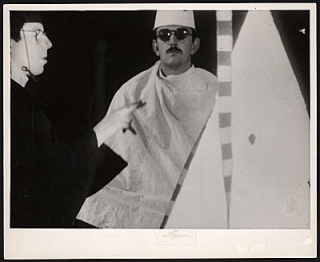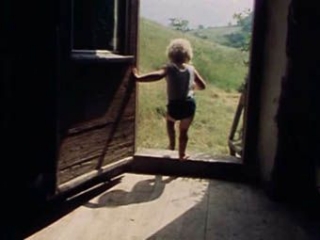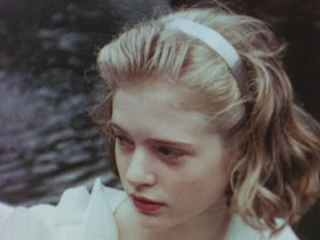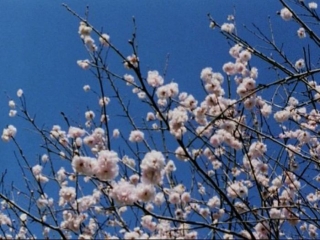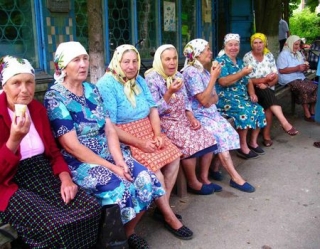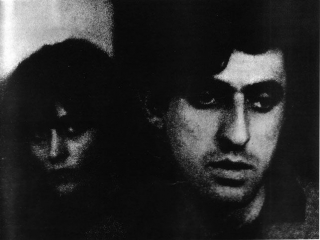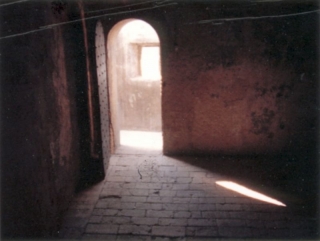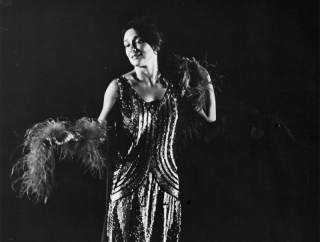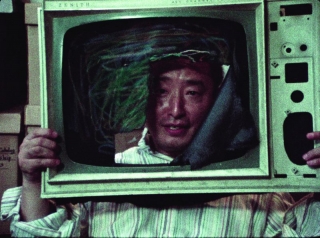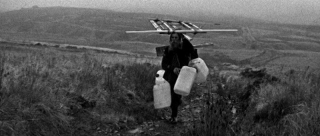Date: 12 April 2011 | Season: Plenty
PLENTY 6: PLASTIC HAIRCUT
Tuesday 12 April 2011, at 7pm
London E:vent Gallery
The screening series PLENTY proposes a new way of looking at artists’ films by showing only a single work, regardless of its duration. Each film is given the freedom to unfold on its own terms, and the viewer is given the time and space to consider it.
PLASTIC HAIRCUT
Robert Nelson, USA, 1963, 16mm, b/w, sound, 15 min
Two actors perform absurd actions in sets composed of geometric shapes. Two experts try to explain what it all means. Goofing off in positive/negative space, Robert Nelson and collaborators William T. Wiley, Ron Hudson, R.G. Davis and Steve Reich construct a spirited work that invokes Alfred Jarry, Dada and improvised theatre.
“None of us knew anything about making movies, but we all knew about art (namely that it had something to do with having a good time).” (Robert Nelson)
Robert Nelson (born 1930) was a key figure of the post-war independent film scene and one of the founders of Canyon Cinema. His belief that filmmaking should be primarily a fun activity created some of the most entertaining and infectious works of the American underground.
PLENTY, a free monthly screening series selected by Mark Webber, forms part of the “Brief Habits” programme curated by Shama Khanna.
Date: 31 May 2011 | Season: Plenty
PLENTY 7: FILMMAKERS’ HOLIDAY
Tuesday 31 May 2011, at 7pm
London E:vent Gallery
The screening series PLENTY proposes a new way of looking at artists’ films by showing only a single work, regardless of its duration. Each film is given the freedom to unfold on its own terms, and the viewer is given the time and space to consider it.
FILMMAKERS’ HOLIDAY
Johan van der Keuken, Netherlands, 1974, 16mm, b/w & colour, sound, 39 min
During a family holiday in the South of France, the filmmaker reflects on his life and career, interweaving excerpts from previous works, fragments of poetry, and the wartime memories of elderly neighbours. As he discovers the world through his son’s eyes, the film veers from the intimate to explore the universal motif of the passage from life to death.
“One of those small masterpieces one encounters by surprise.” (Jean-Paul Fargier, Cahiers du Cinéma)
The prolific documentary maker Johan van der Keuken (1938-2001) is also celebrated photographer. His 55 films, which have been shown in major retrospectives around the world, often explore themes of anthropology, ethnography and economics from a personal viewpoint.
PLENTY, a free monthly screening series selected by Mark Webber, forms part of the “Brief Habits” programme curated by Shama Khanna.
Date: 20 June 2011 | Season: Plenty
PLENTY 8: JOSEPH CORNELL
Monday 20 June 2011, at 7pm
London E:vent Gallery
The screening series PLENTY proposes a new way of looking at artists’ films by showing only a single work, regardless of its duration. Each film is given the freedom to unfold on its own terms, and the viewer is given the time and space to consider it.
THE AVIARY / NYMPHLIGHT / A FABLE FOR FOUNTAINS
Joseph Cornell & Rudy Burckhardt, USA, 1955-57, 16mm, b/w & colour, sound, 19 min
A trilogy of films, united on a single reel, which offer a magical glimpse at New York long since passed. In each, a young woman drifts through the city’s streets and parks, embodying the artists’ distinctive qualities of melancholia and childlike wonder.
“Joseph Cornell describes the marginal area where the conscious and the unconscious meet.” (P. Adams Sitney, Visionary Film)
The artist Joseph Cornell (1903-72) is best known for his enigmatic box constructions. His films likewise used found materials, but on occasion he employed filmmakers Rudy Burckhardt, Stan Brakhage or Larry Jordan to photograph original footage under his direction.
PLENTY, a free monthly screening series selected by Mark Webber, forms part of the “Brief Habits” programme curated by Shama Khanna.
Date: 26 July 2011 | Season: Plenty
PLENTY 9: BOUVIER AND PRUSAKOVA
Tuesday 26 July 2011, at 7pm
London X Marks The Bökship
The screening series PLENTY proposes a new way of looking at artists’ films by showing only a single work, regardless of its duration. Each film is given the freedom to unfold on its own terms, and the viewer is given the time and space to consider it.
BOUVIER AND PRUSAKOVA
Marya Alford, USA, 2005, 16mm, colour, sound, 25 min
To accompany images of cherry blossom against a radiant blue sky, a voice reads an autobiographical account of a relationship. The text is excerpted from the Warren Commission testimony of the wife of Lee Harvey Oswald, assassin of President John F. Kennedy. Titled by the maiden names of their widows, the film parallels the lives of both women.
Screening to coincide with the 70th birthday of Marina Oswald Porter.
Marya Alford (born 1979) studied at Otis College and USC, Los Angeles. She works primarily in photography and installation. Bouvier and Prusakova is her only film to date.
PLENTY, a free monthly screening series selected by Mark Webber, forms part of the “Brief Habits” programme curated by Shama Khanna.
Please note that this screening takes place at X Marks The Bökship, not at our regular venue.
Date: 30 August 2011 | Season: Plenty
PLENTY 10: UNNAMED FILM
Tuesday 30 August 2011, at 7pm
London E:vent Gallery
The screening series PLENTY proposes a new way of looking at artists’ films by showing only a single work, regardless of its duration. Each film is given the freedom to unfold on its own terms, and the viewer is given the time and space to consider it.
UNNAMED FILM
Naomi Uman, Ukraine, 2008, 16mm, colour, sound, 55 min
Naomi Uman stepped into the Ukranian time machine in 2006. 100 years after her grandparents emigrated to the USA, the filmmaker made the reverse journey and settled in a remote village. Her film diary documents her assimilation into the customs of an ageing community, and observes a rural way of life that has changed little over the centuries.
“A hybrid of lyrical and documentary forms, hers is a cinema equally attuned to the unique textures of small-gauge celluloid and the subtleties of cultural difference.” (Light Industry)
Naomi Uman’s work addresses themes of labour, geography, immigration, language and love. She continues to live in the Ukraine, where she makes films, paints, and grows vegetables and flowers.
PLENTY, a free monthly screening series selected by Mark Webber, forms part of the “Brief Habits” programme curated by Shama Khanna.
Date: 27 September 2011 | Season: Plenty
PLENTY 11: ECHOES OF SILENCE
Tuesday 27 September 2011, at 7pm
London E:vent Gallery
The screening series PLENTY proposes a new way of looking at artists’ films by showing only a single work, regardless of its duration. Each film is given the freedom to unfold on its own terms, and the viewer is given the time and space to consider it.
ECHOES OF SILENCE
Peter Emanuel Goldman, USA, 1965, b/w, sound, 75 min
Echoes of Silence chronicles days of angst and languor for three young drifters amid the streets and tenements of Greenwich Village. There is a darkness. Desperate moments, futile liaisons, and the solitude of the big city are conjured in this grainy elegy to existential longing.
“Peter Goldman is the most exciting new filmmaker in recent years. Echoes of Silence, his first film, is a stunning piece of work.” (Susan Sontag)
With his early films, Peter Emanuel Goldman (born 1939) was acclaimed as an independent talent who bridged the gap between the American underground and French New Wave. He recently revisited this period of his life in the novel “Echoes on a Crying Floor”.
PLENTY, a free monthly screening series selected by Mark Webber, forms part of the “Brief Habits” programme curated by Shama Khanna.
NB: This screening was cancelled due to the sudden unavailabity of the film print.
Date: 5 October 2011 | Season: Miscellaneous | Tags: Gregory Markopoulos
IN FOCUS: GREGORY MARKOPOULOS
Wednesday 5 October 2011, at 7pm
Paris Centre Pompidou
Markopoulos’ portrait of the castle of Rocca Sinibalda (then owned by patron, publisher and activist Caresse Crosby) employs a complex system of fades to extend five minutes of footage to an hour of viewing time. The film, in which brief images appear amongst measures of black and clear frames, was a crucial step in an innovation of film form that culminated in the monumental ENIAIOS cycle (1948-90).
Gregory J. Markopoulos, Gammelion, USA, 1968, 16mm, colour, sound, 55 minutes.
Dedicated to Gregg Sharits. Music by Albert Roussel: excerpt from “Serenade”. Text excerpt from Rainer Maria Rilke’s “The Notebooks of Malte Laurids Brigge”, read by Gregory Markopoulos. Filmed at Il Castello Roccasinibalda, Rieti, Italy.
The screening will be introduced by Mark Webber, an independent curator and editor of Film as Film: The Collected Writings of Gregory J. Markopoulos.
Date: 21 October 2011 | Season: London Film Festival 2011 | Tags: London Film Festival
THE BFI 55th LONDON FILM FESTIVAL
21—24 October 2011
London BFI Southbank
The Experimenta Weekend is the London Film Festival’s annual survey of artist’s film and video. Over four days, from 21-24 October 2011, a unique sequence of programmes will offer a curated selection of outstanding work made around the world.
Phil Solomon, renowned for his exquisite 16mm films, will make his first appearance in the UK to introduce the epic American Falls. In a triptych of images, waves of chemically treated celluloid reflect the aspirations and tragedies of the American dream.
Two festival regulars return with debut features: Lewis Klahr’s elliptical narrative The Pettifogger further develops his distinctive cut-out animation techniques; Ben Rivers’ Two Years at Sea mixes fact and fantasy in an extended study of a marginal outsider. Observational filmmaker Robert Fenz and Portuguese artist Gabriel Abrantes are featured in solo screenings.
Contemporary moving image owes much to the pioneering generation of avant-garde filmmakers that appear in Pip Chodorov’s documentary Free Radicals. Jonas Mekas, a central figure in that movement’s history, will present two new works of his own: Sleepless Night Stories and Correspondence (in collaboration with José Luis Guerin). The visionary films of West Coast pioneer Chick Strand, which combine experimental, collage and ethnographic styles, can be rediscovered in newly preserved prints.
The Experimenta Weekend is curated by Mark Webber, with assistance from Adam Pugh and Marina Ribera.
Date: 21 October 2011 | Season: London Film Festival 2011 | Tags: London Film Festival
FREE RADICALS: A HISTORY OF EXPERIMENTAL CINEMA
Friday 21 October 2011, at 6:30pm
London BFI Southbank NFT3
Pip Chodorov, Free Radicals: A History of Experimental Cinema, France, 2010, 82 min
Free Radicals scratches the surface of the history of avant-garde cinema in Europe and the USA, from early post-war pioneers through to the founding of New York’s Anthology Film Archives, a museum whose screen is the exhibition space. Director Pip Chodorov is well-placed to chronicle the movement – he established the Re:Voir label to distribute tapes and DVDs of artists’ films, and counts many key exponents amongst his friends. In this personal journey through experimental movies, he surveys a generation of artists who pushed the boundaries of the medium. Working without compromise, and without financial rewards, they were forced to create their own support structures in an expression of solidarity. Whilst not claiming to be a definitive documentary, Free Radicals is a discerning introduction to the field, and its informal nature provides a privileged glimpse at the personalities involved. Archival footage of Hans Richter, Nam June Paik and Stan Vanderbeek (drawn from TV programmes made by the filmmaker’s father) supplements new interviews with Chodorov’s distinguished acquaintances (Jonas Mekas, Peter Kubelka, Ken Jacobs, Robert Breer) and generous excerpts from the films themselves. (Mark Webber)
Also Screening: Monday 24 October 2011, at 4:15pm, NFT3
& Monday 24 October 2011, at 7pm, BFI Studio
PROGRAMME NOTES
FREE RADICALS: A HISTORY OF EXPERIMENTAL CINEMA
Friday 21 October 2011, at 6:30pm
London BFI Southbank NFT3
FREE RADICALS: A HISTORY OF EXPERIMENTAL CINEMA
Pip Chodorov, France, 2010, video, colour, sound, 82 min
The artists and poets of cinema since before WWI have always been free radicals, crazy about filmmaking and pushing the art form in radical new directions. Trapped in a no man’s land, excluded both from the art world and the film industry, they boldly created a grassroots network for making and showing their films in a spirit of friendship and solidarity. They also created a profound body of work that continues to influence our culture. In this film, I want to share a few of the films I love and introduce you to some of the free, radical artists who made them. (Pip Chodorov)
Paris-based filmmaker and film activist Pip Chodorov offers this affectionate overview of some of the leading figures of, 20th century experimental film. Narrating in a personal and plainspoken manner (‘I’d like you to meet some of my friends and see their films’), Chodorov combines clips and even films in their entirety with conversations with such luminaries as Hans Richter, Robert Breer, Michael Snow, Peter Kubelka, and Stan Brakhage in his final recorded interview. The film takes its title from Len Lye’s direct animation classic. It was up to visionaries like Jonas Mekas and the organizations he founded – Film-Makers’ Cooperative, Anthology Film Archives – to help struggling filmmakers out. (At one point, Ken Jacobs describes dumpster diving for food.) Warm and inspiring, Chodorov’s film is part essay and part loving tribute. (AFI Film Festival)
Back to top
Date: 21 October 2011 | Season: London Film Festival 2011 | Tags: London Film Festival
TWO YEARS AT SEA
Friday 21 October 2011, at 9pm
London BFI Southbank NFT1
Ben Rivers, Two Years at Sea, UK, 2011, 88 min
Using old 16mm cameras, artist Ben Rivers, who has been nominated for the Jarman Prize and has won a Tiger Award at Rotterdam, creates work from stories of real people, often those who have disconnected from the normal world and taken themselves into wilderness territories. His new long-form work extends his relationship with Jake, a man first encountered in his short film This Is My Land. The title refers to the work Jake did in order to finance his chosen state of existence. He lives alone in a ramshackle house, in the middle of the forest. It’s full of curiosities from a bygone age, including a beloved old gramophone. We see his daily life across the seasons, as he occupies himself going for walks in all weathers, and taking naps in the misty fields and woods. Endlessly resourceful, he builds a raft to fish in a loch. Jake has a tremendous sense of purpose, however eccentric his behaviour seems to us. The presence of the camera is irrelevant to him; he has no desire for human contact, and is completely at home in his environment, the nature around him and his constructed abode. Rivers’ gracefully-constructed film creates an intimate connection with an individual who would otherwise be a complete outsider to us. (Helen de Witt)
Also Screening: Monday 24 October 2011, at 1:30pm, NFT1
PROGRAMME NOTES
TWO YEARS AT SEA
Friday 21 October 2011, at 9pm
London BFI Southbank NFT1
TWO YEARS AT SEA
Ben Rivers, UK, 2011, 35mm, b/w, sound, 88 min
Ben Rivers’ feature Two Years at Sea follows Jake Williams (also the subject of one of Rivers’ earlier short films) over the course of two years; a man living in complete isolation in a tumbledown home nestled amidst a magnificent forest, a self-imposed solitary exile from society and modernity. Free from dialogue or interaction with his subject, Rivers’ film makes no attempt to psychologise his subject’s Walden-esque existence, instead documenting over a series of long, often static shots the minutiae of Jake’s self-sufficient relationship to his environment.
Close-ups of weathered photographs offer glimpses of a former life equally in thrall to nature; one spent with friends or family members, now simply ghosts adrift in memory. We watch Jake wake and shower, fetch water and firewood, and in an extraordinary single shot build a raft from an inflatable mattress, taking to the water to fish. His existence is one seeming to grow out of as much as disappear into his surroundings, the ramshackle remnants of modern life which fill his home reconstituted to new purpose, the house itself slowly fusing itself to the landscape. Jake too, as in certain shots reflections of foliage in the windows of his campervan create an impression of the landscape enveloping him, consuming him as he rests.
This symbiosis of the organic and mechanical is beautifully captured by Rivers’ monochrome photography; shooting on reclaimed 16mm Bolex cameras, the shifting textures of the images have a makeshift feel, as though the camera were put together by Jake from parts found in one of his many junk-filled cupboards, the pops and crackles of his bonfire at the end mirrored by those of the celluloid, the flares and white-outs adding to the very fabric of the photographed scenery; the film itself acting on what its capturing.
The serenity of Jake’s gaze in the breathtaking final shot speaks more than an hour of interview footage could, it’s a privilege to be able spend ninety minutes in the company of such an extraordinary individual, one with seemingly no need for human interaction of any kind and it’s a measure of Rivers’ respectful directorial stance that his/our presence never feels intrusive. Much as when the camera looks out from the window of Jake’s observation-tower creation, over the silent, snow-capped forest, one can begin to understand his reason for being there; when it takes in Jake, gazing through the same window, one can equally understand Rivers’ reason too.
(Mathew Thrift, www.cinephile-uk.com)
I made a shorter film about Jake called This is My Land five years ago, and as time has passed and other films have been made, I have had a continual feeling that I should go back. The first film was based solely on observation; standing back and watching Jake go about his business in the forest. I wanted Two Years at Sea to move beyond this, so Jake and I worked on scenes that either re-enacted parts of his daily doings, or were fictions not far from his life. The film embraces the slower perception of time, following rhythms that Jake and his environment have, shot over the course of a year in all the seasons. Two Years at Sea has at its core the relationship between a person and the place they have chosen to live out their life, and the deep connection there is between them. Originally the film was going to be shot in colour, then Kodak announced they were discontinuing my favourite black and white film stock, which prompted me to buy as much as I could and make one of the last films with Kodak Plus-X. The film was hand developed in my kitchen. www.benrivers.com
(Ben Rivers)
Back to top
